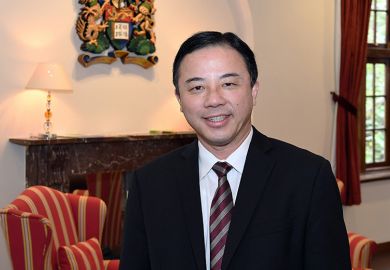Source: Alamy
Unrest is continuing at the institution following the announcement in July that Wendy Purcell, the vice-chancellor, had been “placed on leave” by the board of governors.
In a highly critical statement, Barbara Bond, who has now left Plymouth after serving as its pro-chancellor and before that as chair of governors, calls for Professor Purcell to be reinstated and points the finger at William Taylor, the current chair of governors.
Ms Bond reveals that it was her who contacted the Higher Education Funding Council for England to raise concerns about events at Plymouth – which resulted in the funding council recommending that the university undertake an external, independent review of governance.
Plymouth has said it will not undertake the review until “current internal matters are satisfactorily resolved”.
The university released a statement last week saying it was “continuing with its business as usual” and calling for “an end to any unhelpful and inaccurate speculation”.
However, following that, Ms Bond released her statement. She says that she recently received a letter telling her “that my term of office as pro-chancellor had ended, despite previously agreeing to stay on for a further year at the vice-chancellor’s personal request”.
She refers to “questionable governance practice at Plymouth on the present chair’s watch and his difficulties in working with the vice-chancellor”, later in her statement saying that Judge Taylor has showed “poor governance practice”.
She adds: “I was present as an independent witness at the meeting on 7th May when the chair and vice-chair [Steve Pearce] required the vice-chancellor to step down since she was to be the subject of a board investigation, although no specific complaints or accusations were put to her. I was the person who advised her to remain in her post until the nature of the accusations was made clear…It took the board until last week, more than three months later, to finally spell out their alleged concerns.”
Ms Bond also says: “What is happening at Plymouth is, in my opinion, symptomatic of an issue which may well be happening elsewhere in the HE community, of a chair and a board which are in charge of the profile and development of an ambitious and very successful young university without any understanding of what is involved in the transformational challenge faced by a chief executive seeking to deliver an ambitious and far-reaching vision.”
She adds: “The present action of the chair and his board should not go unchallenged. They have embarked on a process for which the only outcome is one of serious reputational damage to all involved and which would certainly be challenged in an employment tribunal.”
And she concludes: “I have been advised by Hefce that they do not have the power to require the resignation of the chair and that only the board has that power. Before they do any more damage to the university, I earnestly ask the board to stop the process on which they have embarked, to immediately re-instate the vice-chancellor, to institute the governance review as recommended by Hefce, and to follow employment practice and established process if they genuinely believe that the vice-chancellor has acted in any inappropriate way.”
A Plymouth spokesman said: “Following its preliminary enquiries, Hefce informed the university that there was insufficient evidence for it to investigate the allegations into governance arrangements at the university more formally. Any allegations will be scrutinised by the university as it follows through Hefce’s recommendation that the university commissions an independent external review.
“It is a matter of some concern that the correspondence from Mrs Bond, which contains a number of factual inaccuracies, might be used to deflect the attention of the governing body away from the investigation currently underway into the alleged conduct of the vice-chancellor, the resolution of which must be its primary focus.”
The Plymouth spokesman also said: “Barbara completed her three-year term as pro-chancellor in July 2013 but agreed to continue as pro-chancellor until July 2014. As standard procedure, the university has written to Barbara thanking her for her valued support and contribution to the university during her time with us.”
Register to continue
Why register?
- Registration is free and only takes a moment
- Once registered, you can read 3 articles a month
- Sign up for our newsletter
Subscribe
Or subscribe for unlimited access to:
- Unlimited access to news, views, insights & reviews
- Digital editions
- Digital access to THE’s university and college rankings analysis
Already registered or a current subscriber? Login




